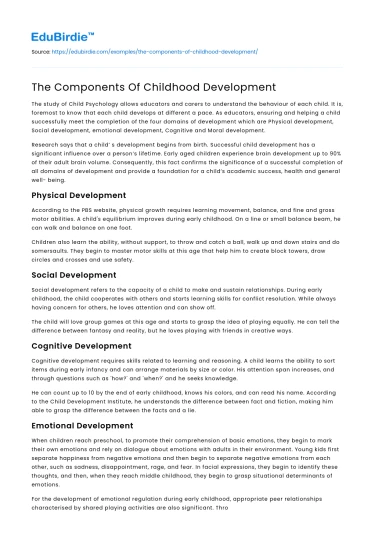The study of Child Psychology allows educators and carers to understand the behaviour of each child. It is, foremost to know that each child develops at different a pace. As educators, ensuring and helping a child successfully meet the completion of the four domains of development which are Physical development, Social development, emotional development, Cognitive and Moral development.
Research says that a child’ s development begins from birth. Successful child development has a significant influence over a person’s lifetime. Early aged children experience brain development up to 90% of their adult brain volume. Consequently, this fact confirms the significance of a successful completion of all domains of development and provide a foundation for a child’s academic success, health and general well- being.
Save your time!
We can take care of your essay
- Proper editing and formatting
- Free revision, title page, and bibliography
- Flexible prices and money-back guarantee
Physical Development
According to the PBS website, physical growth requires learning movement, balance, and fine and gross motor abilities. A child's equilibrium improves during early childhood. On a line or small balance beam, he can walk and balance on one foot.
Children also learn the ability, without support, to throw and catch a ball, walk up and down stairs and do somersaults. They begin to master motor skills at this age that help him to create block towers, draw circles and crosses and use safety.
Social Development
Social development refers to the capacity of a child to make and sustain relationships. During early childhood, the child cooperates with others and starts learning skills for conflict resolution. While always having concern for others, he loves attention and can show off.
The child will love group games at this age and starts to grasp the idea of playing equally. He can tell the difference between fantasy and reality, but he loves playing with friends in creative ways.
Cognitive Development
Cognitive development requires skills related to learning and reasoning. A child learns the ability to sort items during early infancy and can arrange materials by size or color. His attention span increases, and through questions such as 'how?' and 'when?' and he seeks knowledge.
He can count up to 10 by the end of early childhood, knows his colors, and can read his name. According to the Child Development Institute, he understands the difference between fact and fiction, making him able to grasp the difference between the facts and a lie.
Emotional Development
When children reach preschool, to promote their comprehension of basic emotions, they begin to mark their own emotions and rely on dialogue about emotions with adults in their environment. Young kids first separate happiness from negative emotions and then begin to separate negative emotions from each other, such as sadness, disappointment, rage, and fear. In facial expressions, they begin to identify these thoughts, and then, when they reach middle childhood, they begin to grasp situational determinants of emotions.
For the development of emotional regulation during early childhood, appropriate peer relationships characterised by shared playing activities are also significant. Through well-regulated emotional exchanges with peers, children develop emotional awareness and the capacity to empathise and endorse behaviour.
Moral Development
Moral development is the mechanism by which children develop correct attitudes and actions, based on social and cultural expectations, regulations, and laws, towards other individuals in society. It forms part of social development. Children observe and adopt behaviour the rules and expectations of the society they live in. Consequently, they develop a sense of right and wrong.
Conclusion
The theorist, Skinner believed that children learn through experiences. Considering Skinner’s theory, adults around a child, is responsible in observing and providing to the child’s need to fulfil the Developmental Milestones for each four domains of development. Adults and Society play a crucial role in the process of development of children.






 Stuck on your essay?
Stuck on your essay?

